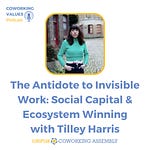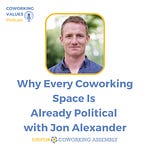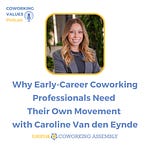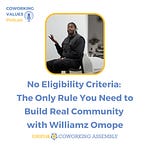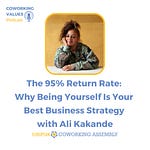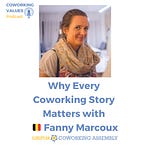Episode Summary
“In a former Soviet state, you derive your power from secrecy in a lot of ways. We were turning that idea upside down and pushing forth that collaboration is actually power and sharing is power.”
Sara Anjargolian didn’t move to Armenia in 2012 because it was easy. She moved because she couldn’t look away.
An American lawyer watching a former Soviet state slide back toward authoritarianism. A country where power came from what you knew, not who you were. Where work happened behind closed doors and strength meant keeping secrets.
And then she did something that sounded simple but was actually radical: she built a space with glass walls.
Impact Hub Yerevan opened in 2015 with 500 square metres of transparency in a culture built on opacity. Everyone could see what everyone else was doing, who they were meeting with, and what projects were taking shape.
Four members who’d never have met otherwise—an architect, a winemaker, a crowdfunding platform—started collaborating on a project to empower rural grape farmers. Instead of just selling grapes to winemakers, these farmers now operate their own tasting rooms on their land.
That’s the small story.
The big story is what happened when the values inside those glass walls—trust, collaboration, openness—started spilling out onto the streets.
When the coworking space became a rehearsal room for the Velvet Revolution of 2018. Not one person died during a peaceful uprising that toppled an authoritarian regime.
Sara’s now based in Los Angeles, but she spent years building something that proved a controversial point: community spaces aren’t neutral. They’re either reinforcing the culture around them or quietly teaching a different way.
This conversation doesn’t offer inspiration. It offers evidence. Evidence that who you intentionally throw together in a room matters.
That transparency can be more powerful than secrecy. That starting with an Excel spreadsheet of 20-30 people is more important than falling in love with a sexy space.
Sara talks about trauma—the 1915 genocide that created the Armenian diaspora, the 2020 war with Azerbaijan that turned their coworking space into a humanitarian centre during COVID. She talks about watching members fight on the front lines whilst the space tried to help displaced families.
And she talks about what happens when you refuse to accept that you’re powerless. When you reject the idea that there’s much difference between people “on the ground” and people in “halls of power.”
This episode is for coworking operators who feel overwhelmed by political division and global chaos. For community builders, wondering if their small space actually matters. For anyone who’s ever thought, “I’m just one person—what can I really do?”
You’ll leave understanding why the cocktail party matters more than the furniture. Why boring Excel spreadsheets beat beautiful architecture. And why getting involved in what makes you come alive isn’t optional—it’s essential for your soul.
Timeline Highlights
[01:13] “I’m known as someone very involved and heavily invested in building the future Republic of Armenia”
[02:32] Sara’s decision to move to Armenia in 2012: “I didn’t even think about it as easy or hard. I thought about it, and I thought, This is really interesting. I want to be part of it”
[03:27] Why Impact Hub Yerevan wasn’t just a coworking space: “The idea was really more about bringing the best and brightest and people who cared about social change in Armenia under one roof to see what we could do”
[06:56] Building with glass walls as a philosophical statement: “You derive your power from secrecy in a lot of ways. We were turning that idea upside down”
[07:17] The grape farmer collaboration story: four members creating rural tasting rooms instead of just selling grapes
[13:20] The Velvet Revolution of 2018: “Not one person died during that revolution. It was very much a peaceful revolution”
[15:02] The moment the country caught up to the Hub: “All of a sudden, the country outside of the walls of Impact Hub started to espouse the same values as what we had been talking about inside”
[18:39] Sara’s advice on feeling powerless: “I don’t think that we have much less power. In terms of being a human, we are all the same beings, and you have to get involved”
[20:53] The intentional curation approach: “It was, I’m going to reach out to this person because I see that they’re doing something cool. They need to be part of our community”
[23:09] The crucial mistake to avoid: “I would caution people not to fall in love with spaces... start very much with the people”
[24:37] Three Impact Hubs now operating across Armenia: Yerevan, Gyumri, and Syunik
Why Secrecy Loses to Collaboration
Sara describes post-Soviet Armenia as a place where power came from what you kept hidden. Behind closed doors. Need-to-know basis. Information as currency.
This wasn’t just workplace culture. It was a survival strategy shaped by decades of authoritarian rule.
Impact Hub Yerevan’s glass walls weren’t an aesthetic choice. They were a political statement wrapped in architecture. When everyone can see what everyone else is doing, you’re demonstrating a different kind of power—one built on trust, not control.
The shift wasn’t immediate. Members had to learn a new philosophy of working together. Sara says when people signed up to work from this space, “in a way, they were signing up to a new philosophy of working together.”
Slowly, people started collaborating. Starting projects. Sharing resources. The winemaker noticed the architect. The crowdfunding platform connected with both. And suddenly, rural grape farmers weren’t just suppliers—they were hosts, entrepreneurs, storytellers on their own land.
This is what happens when you design space intentionally against the dominant culture. You create a small rehearsal room for a different way of being.
The Cocktail Party Strategy Nobody Teaches
Sara uses a metaphor that should be taught in every coworking space training programme: throwing an elaborate cocktail party.
You want the person dancing on the table with a lampshade on their head. You also wish to be the quiet person in the corner building the next big thing. You’re making soup with different spices. You’re curating energy, not just renting desks.
She describes making lists. Reaching out to people doing interesting things. Constantly inviting them to the party.
This isn’t community management. It’s deliberate cultural architecture.
Bernie recognises it immediately—he has a reputation for throwing people together and then leaving them to find their connection points. But he adds something crucial: loud people like him can put off quieter people, so you have to make a point of getting them in.
The best coworking spaces understand this. They’re not waiting for the right people to show up. They’re hunting them down, one Excel spreadsheet row at a time.
When Your Space Becomes a Humanitarian Centre
2020 was meant to be about COVID. For Armenia, it became a matter of war.
Azerbaijan attacked the ethnic Armenian population of Nagorno-Karabakh for 44 days. Sara notes that “the world was so much more concerned with dealing with COVID, that this war happened really in some ways outside of the international attention.” The ethnic Armenian population was expelled. The land is now under Azerbaijani control.
Impact Hub Yerevan transformed overnight. Sara describes it: “We turned from a coworking space in a lot of ways into almost a humanitarian centre, trying to help not just our boys on the front lines fighting this war, but at the same time, all of the people who were displaced from their homes during the war.”
Sara doesn’t dwell on this in the conversation—she could go on and on, she says, but she stops. You can hear the weight of it, though. The trauma that sits underneath community building in places where history isn’t theoretical.
This is the context that makes glass walls radical. This is why collaboration as a form of power matters. This is the soil where Impact Hub grew.
Western coworking operators often discuss “making an impact” without understanding the actual cost of such an impact in places experiencing active conflict and displacement.
The Velvet Revolution: When Inside Became Outside
Armenia was sliding toward full authoritarianism. Following the Belarus path. Satellite state of Russia.
The Armenian people said no.
Streets filled with protesters. The former regime resigned. A new government was formed. Zero deaths. The Velvet Revolution.
Sara was running Impact Hub at the time. Many of the people on the streets were Hub members. Including her.
Then came the pivot: she left the Hub, passed the executive director role to her director of programmes, and joined the new government.
She transitioned from running a space that promoted these values to helping build a government that embodied them.
This is the moment she describes carefully: “All of a sudden, the country outside of the walls of Impact Hub started to espouse the same values as what we had been talking about inside the walls.”
Not inspiration. Vindication.
The rehearsal became the performance. The small room became the whole country. The glass walls became the new architecture of power.
The Boring Excel Spreadsheet Truth
Here’s Sara’s most practical advice, delivered with the caution of someone who’s seen coworking spaces fail by starting wrong:
Don’t fall in love with the space.
Cofounders are often drawn to the stunning light, beautiful windows, and intriguing architecture. They put down deposits before they know who’ll actually show up.
Start with 20-30 names in a boring Excel spreadsheet. People you can actually imagine working in this space. Before doing anything else. Before architecture. Before deposits.
Impact Hub Yerevan had an incredible architect. But they started with the people.
This feels unglamorous. It doesn’t photograph well for Instagram. It won’t win design awards.
But it’s the difference between a coworking space and a rehearsal room for revolution.
What “Getting Involved” Actually Means
Bernie asks the question that matters: people running community spaces feel overwhelmed. The world is changing at a rate of 100 miles an hour. Politics is everywhere. Division is constant. What can they actually do?
Sara doesn’t buy the excuse: “I don’t think that there is much difference between those of us, if I can say so, on the ground and those people in the various halls of power. We’re all people, humans.”
She pushes harder: “Whatever it is that excites you, that makes you come alive in this larger world, is where you should start.”
Not because you’ll definitely make an impact. Not because you’ll change everything. But because the opposite is bad for your soul.
Work on what makes you come alive. Don’t worry about measuring impact. The measuring will kill your momentum.
This isn’t motivational speaking. This is someone who joined a peaceful revolution, then joined the government it created, speaking from the other side of that choice.
The Performative Versus the Essential Problem
Bernie highlights a crucial point: he sees coworking spaces being overly performative about making a difference. Marketing well-intentioned things because it creates a well-meaning place to be.
But when you talk to Sara, or Mari from the Puerto Rico episode Bernie mentions, there’s a different quality. “If we weren’t here, people would have nowhere to go.”
That’s not marketing. That’s infrastructure.
The difference matters. One is creating content about impact. The other is being the thing that holds people when everything else fails.
Sara and Mari both ran spaces that became essential during crises—hurricanes, wars, and revolutions.
Sara describes how intentional they were: “I remember making lists of people and organisations that at least I had heard through the grapevine or had seen online doing interesting things and constantly inviting people into that cocktail party.”
You can’t perform your way into being genuinely needed. You have to build something that matters before the crisis comes.
Links & Resources
Sara Anjargolian’s Work
Impact Hub Yerevan - The mothership location near the main train station
Impact Hub Gyumri - Second largest city in Armenia
Impact Hub Syunik - Southern region of Armenia
Projects & Community
Join this and other conversations with people in the LinkedIn Coworking Group.
Unreasonable Connection Monthly online gatherings for Coworking Community Builders.
Bernie’s Projects
London Coworking Assembly 5-Day AI Crash Course for Coworking Spaces
Free email course: 5 Biggest Mistakes Coworking Community Builders Make (And How to Avoid Them)
One More Thing
Coworking brings communities together, helping people find and share their voices.
Each episode of the Coworking Values Podcast explores Accessibility, Community, Openness, Collaboration, and Sustainability—values that shape the spaces where we gather, work, and grow.
If this resonates with you, rate, follow, and share the podcast. Your support helps others discover how coworking enriches lives, builds careers, and strengthens communities.
Community is the key 🔑




